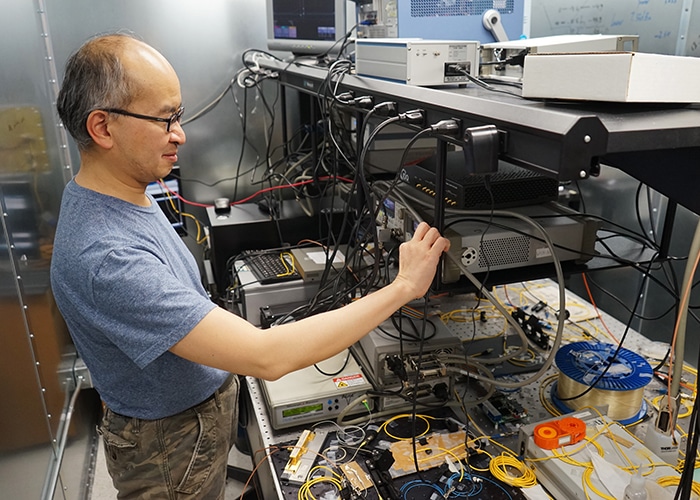Jan 29 2019
Scientists at the University of Toronto Engineering have shown proof-of-concept for a device that could act as the mainstay of a future quantum Internet. Professor Hoi-Kwong Lo (ECE, Physics) and his collaborators have created a prototype for a core element for all-photonic quantum repeaters, a crucial step in long-distance quantum communication.
 Professor Hoi-Kwong Lo (ECE) and his collaborators have performed a proof-of-principle experiment on a key aspect of all-photonic quantum repeaters. (Image credit: Jessica MacInnis)
Professor Hoi-Kwong Lo (ECE) and his collaborators have performed a proof-of-principle experiment on a key aspect of all-photonic quantum repeaters. (Image credit: Jessica MacInnis)
A quantum Internet is considered as the “Holy Grail” of quantum information processing, allowing numerous novel applications such as information-theoretic secure communication. Present-day Internet was not specially designed for security, and evidence can be seen: break-ins, hacking, and computer espionage are common issues. Nefarious hackers are continuously breaching high-tech layers of defense put together by individuals, governments, and corporations.
Consequently, scientists have suggested other means of conveying data that would leverage core features of quantum physics to deliver virtually unbreakable encryption. One of the most favorable technologies involves a method called quantum key distribution (QKD). QKD manipulates the fact that the basic act of sensing or measuring the state of a quantum system interrupts that system. Due to this, any third-party snooping would leave behind an unmistakably detectable trace, and the communication can be terminated before any sensitive data is stolen.
So far, this type of quantum security has been seen in small-scale systems. Lo and his team are among a team of international scientists who are laying the foundation for a future quantum Internet by working to solve a few of the challenges in conveying quantum information across long distances, using optical fiber communication.
Since light signals tend to lose potency while traveling great distances via fiber-optic cables, devices known as repeaters are inserted at systematic intervals along the line. These repeaters improve and amplify the signals to help convey the data along the line.
However, quantum information is not similar, and current repeaters for quantum information are very tricky. They require the quantum state to be stored at the repeater sites, rendering the repeaters much more susceptible to error, hard to erect, and very costly because they mostly operate at cryogenic temperatures.
Lo and his team have come up with a different method. They are involved in developing the next generation of repeaters, known as all-photonic quantum repeaters, which would remove or reduce a number of inadequacies of basic quantum repeaters. With partners at Osaka University, Toyama University, and NTT Corporation in Japan, Lo and his colleagues have shown proof-of-concept of their research in a paper recently published in Nature Communications.
We have developed all-photonic repeaters that allow time-reversed adaptive Bell measurement. Because these repeaters are all-optical, they offer advantages that traditional—quantum-memory-based matter—repeaters do not. For example, this method could work at room temperature.
Hoi-Kwong Lo, Professor of ECE and Physics, University of Toronto Engineering.
A quantum Internet could provide applications that are difficult to implement in the conventional Internet, such as quantum teleportation and impenetrable security.
An all-optical network is a promising form of infrastructure for fast and energy-efficient communication that is required for a future quantum internet. Our work helps pave the way toward this future.
Hoi-Kwong Lo, Professor of ECE and Physics, University of Toronto Engineering.